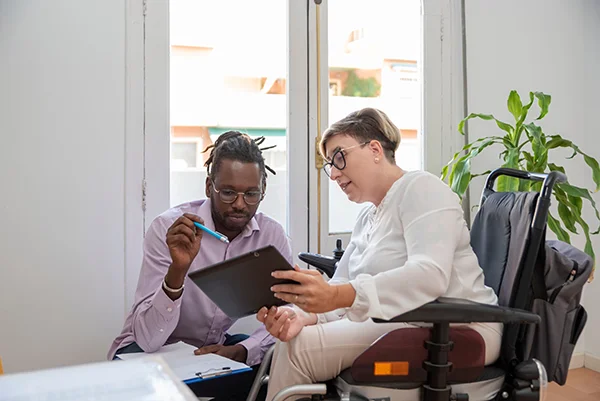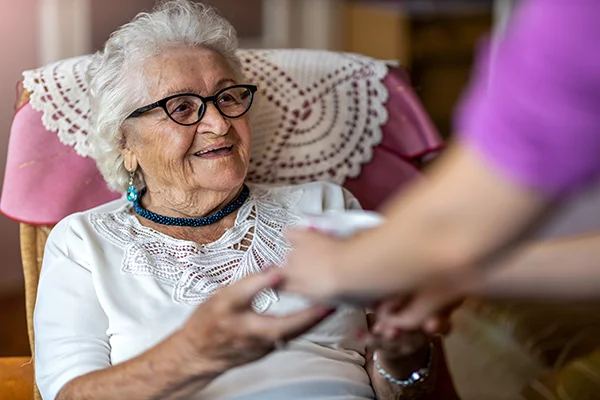Transition Coordination Program
The Money Follows the Person (MFP) Transition Coordination Program helps older adults and people with physical disabilities who live in facilities move back into the community. Participants receive personalized support to ensure a smooth and successful transition to live more independently.
Vaya Health operates this program in all of North Carolina’s 100 counties on behalf of the North Carolina Department of Health and Human Services.

Eligibility requirements
Older adults and people with physical disabilities may be eligible if they:
- Receive Medicaid or are eligible for Medicaid in North Carolina (participants are not required to be a Vaya member)
- Live in a Skilled Nursing Facility or qualified hospital setting for at least 60 consecutive days (this period can include time spent in an acute hospital setting)
- Have a diagnosed physical disability (age 18 and older) or are above age 55
- Want to and can live independently in the community, with appropriate supports
Application and informed consent
To apply, complete the Application Form (English | Español) and the Informed Consent Form (English | Español). Follow the instructions on the forms to submit both documents to NC Medicaid.
Application
The application is the first step in the process. Eligible individuals express their interest in moving back into the community. The application collects important information to determine eligibility and needs. It ensures the applicant understands the program and begins the process of creating a personalized transition plan.
Informed consent
The informed consent form outlines participant rights, responsibilities, and information about health care services they will receive. It ensures the participant fully understands the benefits, risks, and expectations before consenting to participate. This document also includes information on how to revoke consent if they choose to leave the program.
For more information, call our toll-free Member and Recipient Service Line at 1-800-962-9003 (TTY 711). This line is available 7 a.m. to 6 p.m., Monday – Saturday, including holidays. You can also email us at MFP@vayahealth.com.
Program features
Key program features
- Individualized transition plans: Each participant has a personalized transition plan. This plan includes steps for moving back into the community, finding housing, and getting health care services.
- Comprehensive support services: Participants have access to a wide range of services and supports to help them live independently. Vaya provides transition coordination, housing assistance, connections to community resources, and more.
- Collaboration with community partners: Vaya works with housing authorities, health care providers, and community organizations to make sure participants have the resources they need.
- Person-centered approach: Vaya places the participant at the center of all planning and decision-making. Vaya respects an individual’s choice and empowers participants to make informed decisions about their care and living arrangements.
Steps to transition
- Referral and initial review: The process begins with a referral and a full review of the participant’s needs and wants.
- Transition plan creation: A Vaya Transition Coordinator helps participants develop a transition plan. This plan has details about housing options.
- Pre-transition support: Vaya helps participants prepare for the move. This step may include arranging for home modifications, making plans for transportation and medical care, and working with the Home-and Community-Based Services provider to develop a person-centered plan of care.
- Transition day: The Transition Coordinator makes sure the day of the move goes smoothly and that critical supports are in place.
- Post-transition follow-up: After the move, Vaya staff visit participants in their new home and offer support. We want to make sure they are doing well and have access to the services they need. Post-transition follow-up continues for 365 days.
Program goals
Empowering independence and enhancing quality of life: The Transition Coordination Program’s main goal is to support participants in transitioning from institutional settings back into their communities. By providing support and resources, we aim to:

- Promote independence: Help participants live independently in their own homes or community-based settings
- Enhance quality of life: Improve overall quality of life for participants by helping them live in a more integrated and less restrictive environment
- Facilitate community integration: Help participants become active and involved in their communities
- Ensure long-term success: Provide ongoing support and follow-up services to ensure participants remain successful in their new living arrangements
- Reduce institutionalization: Decrease reliance on institutional care by making community-based living a viable and sustainable option
For more information, visit the NC Medicaid Money Follows the Person webpage.
